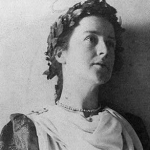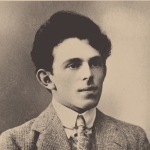On this Day I Complete my Thirty-Sixth Year
'Tis time this heart should be unmoved,
Since others it hath ceased to move:
Yet though I cannot be beloved,
Still let me love!
My days are in the yellow leaf;
The flowers and fruits of Love are gone;
The worm—the canker, and the grief
Are mine alone!
The fire that on my bosom preys
Is lone as some Volcanic Isle;
No torch is kindled at its blaze
A funeral pile.
The exalted portion of the pain
And power of Love I cannot share,
But wear the chain.
But 'tis not thus—and 'tis not here
Such thoughts should shake my Soul, nor now,
Where Glory decks the hero's bier,
Or binds his brow.
The Sword, the Banner, and the Field,
Glory and Greece around us see!
The Spartan borne upon his shield
Was not more free.
Awake (not Greece—she is awake!)
Awake, my Spirit! Think through whom
Thy life-blood tracks its parent lake
And then strike home!
Tread those reviving passions down
Unworthy Manhood—unto thee
Indifferent should the smile or frown
Of beauty be.
If thou regret'st thy Youth, why live?
The land of honourable death
Is here:—up to the Field, and give
Away thy breath!
Seek out—less often sought than found—
A Soldier's Grave, for thee the best;
Then look around, and choose thy Ground,
And take thy rest.


















Comment form: